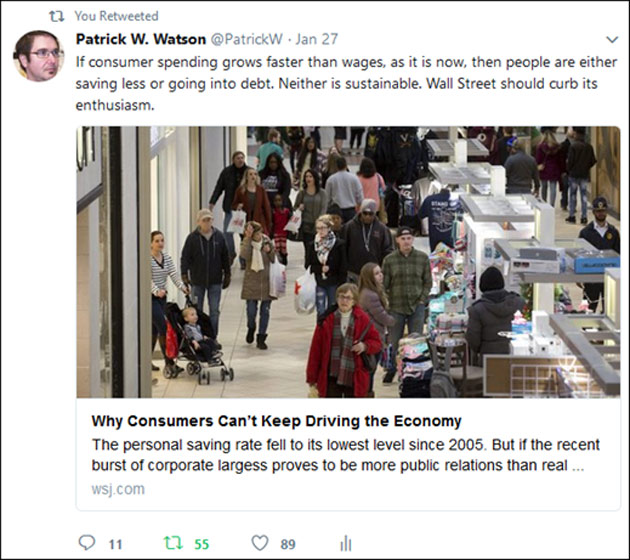| -- | January 30, 2018 Teach Your Brain to Beat the Robots By Patrick Watson Robots and AI are coming for your job. And if you’re already retired, they’re still coming for your kids. | Are you interested in -
Gaining insight into today’s most important investment trends? -
Networking with some of the world’s top money managers and economists?
Reserve your seat SIC 2018 now! |
We can try to slow down this process—or at least ease the pain it causes—but I doubt we can stop it. And we probably shouldn’t, because a brighter future awaits on the other side. So how to get there intact? Make the most of your most valuable asset: your brain. It’s capable of things even the most advanced artificial intelligence still can’t do. But AI is gaining fast. We have no time to waste, so let me give you some ideas. 
Photo: Getty Images Straight Talk Billionaire and Dallas Mavericks owner Mark Cuban is a straight talker. Last year, I saw him at the South by Southwest Conference, and he said something that stuck with me. The moderator asked him what subjects young people should study to gain an advantage in the future. Cuban said: We are going through the process where software will automate software, automation will automate automation. I would not want to be a CPA right now. I would not want to be an accountant right now. I would rather be a philosophy major. Knowing how to critically think and assess them from a global perspective I think is going to be more valuable than what we see as exciting careers today, which might be programming or CPA or those types of things. That advice goes against the grain. Career counselors tell students to learn computer skills, know how to “code” in the latest hot software language. Cuban thinks that is short-sighted because whatever technical skills you acquire, they will get obsolete quickly. But does it make sense to study philosophy, one of the most impractical fields? Everyone knows philosophy majors never make any money. Or do they? Carl Icahn’s philosophy degree served him well. Ditto for Peter Thiel, George Soros, former HP CEO Carly Fiorina, Overstock.com founder Patrick Byrne, and Legg Mason fund manager Bill Miller. All have philosophy degrees or advanced studies. Basketball coach Phil Jackson is a philosopher too. Maybe he gave Cuban the thought. 
Photo: Getty Images It’s true that some branches of philosophy are esoteric, to say the least. But at the core, it’s about thinking logically and critically—a valuable skill in any career. Furthermore, the logical principles that drive most software code came from philosophers. Knowing them can be useful, but to beat the bots, you need more. By the Numbers I was one of those kids who hated math, but later I realized its importance. Math teaches logical reasoning and attention to detail, and it helps you think under pressure. Finding that one possible solution can be hard—but doing it will increase your mental endurance. Math is about structure, developing principles that hold true even if you change the components. That’s helpful in economic analysis. For instance, here’s something I tweeted last weekend. 
https://twitter.com/PatrickW/status/957274172400553984 What I described in the tweet is really a mathematical formula. The variables are consumer spending, wage growth, savings rate, and consumer debt. They all relate to each other and can only move certain ways. Math helps at any age, and you don’t need a degree to benefit from it. Just some free online math study at Khan Academy will make you a better thinker—and help you survive job automation. It also might increase your income. 
Photo: Getty Images Language Differences In one sense, math is the language of technology. Computers “think” in ones and zeros. But human languages count too. When people study a foreign language, it’s usually because they want to speak or read it. However, the study is useful even if you never gain fluency. For one thing, learning about another language helps you understand your own language better. Since languages shape how we think, you’ll also gain insight into the mentality of the other language’s native speakers. Chinese, for instance, doesn’t use verb tenses to denote past, present, and future. It’s no coincidence that many Chinese-speaking people conceive of “time” quite differently from English speakers. Knowing this helps explain some things. English has its peculiarities as well. Because we lack gender-neutral pronouns but want to be inclusive, we say “he or she” to describe a person of unknown gender. That’s awkward, and resentment of it has affected our politics and economy. (Incidentally, the Associated Press decided last year “they” is acceptable for singular, gender-neutral references. I think that’s even worse.) Studying another language helps your brain recognize those differences. This makes your thinking more flexible and widens the opportunities you can seize. 
Photo: Getty Images Explore New Concepts The three fields I just described—philosophy, math, and foreign languages—together form a great foundation for learning almost anything. Familiarity with them will equip you to compete against automation in this rapidly changing economy. We’ll be exploring the economy and markets at this year’s Strategic Investment Conference in San Diego, March 6–9. Besides gaining exceptional insights at the conference, you’ll get to meet some of the world’s most brilliant investment thinkers. The SIC is small enough that you can rub elbows with all the speakers. In fact, some of the best discussions happen in hallways between sessions or at the evening social events. I hope you’ll join me and the rest of the Mauldin Economics team in San Diego for the SIC this year. It really is a superb line-up with speakers like Jeffrey Gundlach, John Burbank, and Niall Ferguson, plus about 20 other top financial and geopolitical wizards. If you are interested in attending the SIC, you can get all the details by clicking here. See you at the top,  Patrick Watson P.S. If you’re reading this because someone shared it with you, click here to get your own free Connecting the Dots subscription. You can also follow me on Twitter: @PatrickW.  | Subscribe to Connecting the Dots—and Get a Glimpse of the Future
We live in an era of rapid change… and only those who see and understand the shifting market, economic, and political trends can make wise investment decisions. Macroeconomic forecaster Patrick Watson spots the trends and spells what they mean every week in the free e-letter, Connecting the Dots. Subscribe now for his seasoned insight into the surprising forces driving global markets. |
 Senior Economic Analyst Patrick Watson is a master in connecting the dots and finding out where budding trends are leading. Patrick is the editor of Mauldin Economics’ high-yield income letter, Yield Shark, and co-editor of the premium alert service, Macro Growth & Income Alert. You can also follow him on Twitter (@PatrickW) to see his commentary on current events. Senior Economic Analyst Patrick Watson is a master in connecting the dots and finding out where budding trends are leading. Patrick is the editor of Mauldin Economics’ high-yield income letter, Yield Shark, and co-editor of the premium alert service, Macro Growth & Income Alert. You can also follow him on Twitter (@PatrickW) to see his commentary on current events.
Share Your Thoughts on This Article

Use of this content, the Mauldin Economics website, and related sites and applications is provided under the Mauldin Economics Terms & Conditions of Use. Unauthorized Disclosure Prohibited The information provided in this publication is private, privileged, and confidential information, licensed for your sole individual use as a subscriber. Mauldin Economics reserves all rights to the content of this publication and related materials. Forwarding, copying, disseminating, or distributing this report in whole or in part, including substantial quotation of any portion the publication or any release of specific investment recommendations, is strictly prohibited.
Participation in such activity is grounds for immediate termination of all subscriptions of registered subscribers deemed to be involved at Mauldin Economics’ sole discretion, may violate the copyright laws of the United States, and may subject the violator to legal prosecution. Mauldin Economics reserves the right to monitor the use of this publication without disclosure by any electronic means it deems necessary and may change those means without notice at any time. If you have received this publication and are not the intended subscriber, please contact service@mauldineconomics.com. Disclaimers The Mauldin Economics website, Yield Shark, Thoughts from the Frontline, Patrick Cox’s Tech Digest, Outside the Box, Over My Shoulder, World Money Analyst, Street Freak, ETF 20/20, Just One Trade, Transformational Technology Alert, Rational Bear, The 10th Man, Connecting the Dots, This Week in Geopolitics, Stray Reflections, and Conversations are published by Mauldin Economics, LLC. Information contained in such publications is obtained from sources believed to be reliable, but its accuracy cannot be guaranteed. The information contained in such publications is not intended to constitute individual investment advice and is not designed to meet your personal financial situation. The opinions expressed in such publications are those of the publisher and are subject to change without notice. The information in such publications may become outdated and there is no obligation to update any such information. You are advised to discuss with your financial advisers your investment options and whether any investment is suitable for your specific needs prior to making any investments.
John Mauldin, Mauldin Economics, LLC and other entities in which he has an interest, employees, officers, family, and associates may from time to time have positions in the securities or commodities covered in these publications or web site. Corporate policies are in effect that attempt to avoid potential conflicts of interest and resolve conflicts of interest that do arise in a timely fashion.
Mauldin Economics, LLC reserves the right to cancel any subscription at any time, and if it does so it will promptly refund to the subscriber the amount of the subscription payment previously received relating to the remaining subscription period. Cancellation of a subscription may result from any unauthorized use or reproduction or rebroadcast of any Mauldin Economics publication or website, any infringement or misappropriation of Mauldin Economics, LLC’s proprietary rights, or any other reason determined in the sole discretion of Mauldin Economics, LLC. Affiliate Notice Mauldin Economics has affiliate agreements in place that may include fee sharing. If you have a website or newsletter and would like to be considered for inclusion in the Mauldin Economics affiliate program, please go to http://affiliates.ggcpublishing.com/. Likewise, from time to time Mauldin Economics may engage in affiliate programs offered by other companies, though corporate policy firmly dictates that such agreements will have no influence on any product or service recommendations, nor alter the pricing that would otherwise be available in absence of such an agreement. As always, it is important that you do your own due diligence before transacting any business with any firm, for any product or service. © Copyright 2018 Mauldin Economics | -- |
